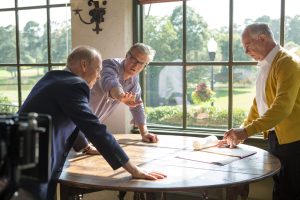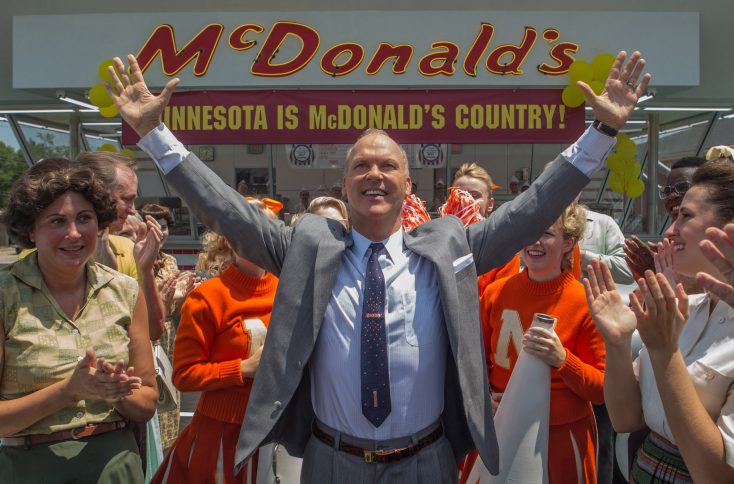
Director John Lee Hancock (center) on the set of THE FOUNDER with Michael Keaton (l) and Mike Pniewski (r). ©The Weinstein Company. CR: Daniel McFadden.
By ANGELA DAWSON
Front Row Features
HOLLYWOOD—Academy Award nominee Michael Keaton (“Birdman”) knew as much about McDonald’s Ray Kroc as the next guy. Widely regarded as the multinational fast food chain’s brilliant founder, Kroc started out a struggling restaurant equipment salesman who saw an opportunity, seized it and then claimed the glory for himself.
The story of Kroc and the actual brothers (Mac and Dick McDonald) who built the first burger stand and pioneered the fast-food concept, is told in the multi-layered drama “The Founder,” directed by John Lee Hancock (“Saving Mr. Banks”) from a script by “The Wrestler” scribe Robert Siegel.
Keaton, a journeyman actor who has enjoyed a resurgence in his career with the success of 2014’s “Birdman” and the acclaimed journalism drama “Spotlight” the following year, plays the successful burger-meister who built one of the world’s largest fast-food empires. (As the film points out, McDonald’s feeds 1 percent of the world’s population every day.) Though he had failed at previous business ventures, Kroc was savvy enough (some might use a less flattering term) to see the potential for a profitable franchise when, in 1954, he visited the McDonalds’ burger restaurant in Southern California.
Observing how the brothers created an efficient assembly line-like system in their kitchen that allowed for speedy service that attracted hungry customers, he convinced them to take him on as a partner so he could expand their business into a franchise. Gradually, though, the ambitious Kroc wrestled McDonald’s from the brothers, who were then forced to relinquish their ownership stake in the company and even had to give up the name of their restaurant chain to Kroc. The film also delves into Kroc’s relationships with his first wife, Ethel (played by Laura Dern) and his second wife, Joan (Linda Cardellini), with whom he shared a common goal of building a fast-food empire.
Dressed in a puffy black jacket, jeans and wearing a plaid cap, the chatty and charming Keaton discussed depicting the complicated business tycoon.
Q: How familiar were you with the story of Ray Kroc before you embarked on this project?
Keaton: I fell somewhere in the middle range. Most people 40 and up may think they know Ray Kroc, (whispering) until you see the movie. (He laughs.) No, you think you know Ray Kroc. If someone asks you, “Who’s Ray Kroc?” you’d say, “McDonald’s.” But if they asked, “Be more specific,” you’d be like Jackie Gleason going, “Habida, habida, habida” because you don’t really know what (the story) is. So I knew a little bit. I’m a curious person; I read a great deal. I thought I got it but I didn’t get it at all.
I just find the (McDonald) brothers and their story really interesting. I just found the whole story generally interesting and it kept unfolding because Robert (Siegel) and John (Lee Hancock) kept supplying information and it kept getting more and more interesting.
Q: What do you think the legacy of Kroc’s franchise success story?
Keaton: It changed culture beyond food. We’re a portable society. When you stop to think of it, you have to have to hire machinists to build the assembly line. Just think of that, in and of itself. That led to a portable society and a disposable society, and that’s not over-blowing the whole thing.
I talked to Nick (Offerman, who plays Dick McDonald) about this. Part of the year, I live in Montana … and I lease out my place to the guy down the road who runs his cattle on it. We rotate how we graze because people don’t realize what impact (raising cattle) has not only with the methane (expelled by the cattle) but if you overgraze, environmentally, exponentially, it affects everything.
Q: Ray Kroc is a very complicated character. Did your feelings about him change while you were making the movie?
Keaton: I did some press early on in Europe. I heard it there and I heard it from a few journalists from outside the (United States) yesterday and this morning on the phone they bring it up. It’s interesting because the U.S. journalists don’t bring this up and that is the issue of the American Dream. This is fascinating to me unless I missed something. I can go on and on about consumerism, waste, greed, etc.
The (foreign journalists) perception of what the American Dream is, and let me be a little more specific, not to miss the issue with such a generalization, when they talk about the American Dream, they do it in relation to billions (of dollars) and mansions. They kind of make this assumption that (it is) an extravagant lifestyle of private jets, owning islands and everything. That’s fascinating to me because my concept of the American Dream, unless I missed something here, in its simplest form is work hard enough and there will be a job available and (then) you can buy a house and you can buy a car to get you back and forth from work so that you can afford that house, and have couple of kids who can attend a good school. And then you get a vacation and maybe a second car. Unless I missed something, that ain’t a bad thing. That’s what it was, (but) that’s not what the perception is (elsewhere). It’s this other thing. I don’t think it’s an ugly thing. I have no problem with billionaires, especially billionaires like Bill Gates who do the (philanthropic) thing or like my friend (Patagonia founder and environmentalist) Yvon Chouinard. Pick one. There are a bunch of them out there. But there’s this other perception out there. Am I nuts? That’s not what the (American Dream) was.
Q: As depicted in the film the McDonald brothers wouldn’t sacrifice growth for quality but Kroc’s dream was to make the business huge, no matter what. What’s your take?
Keaton: The (McDonald brothers) were businessmen. They wanted to do well. I was asked the other day what McDonald’s would have become (had Kroc not been involved) and I said, “Hopefully, it would have been like (regional Southwest fast food chain) In-N-Out Burger.” I remember when I moved to California, I had my first In-N-Out burger. I had made a little bit of dough, so I got on the phone with my business manager who had about $1,100 (of my money). That’s about all I had. I told him that I’d had this hamburger and we ought to look at (investing) in In-N-Out Burger. I immediately learned exactly what they were (a privately held family business). They owned the dirt (the building and land) and it’s family-owned, which I thought was interesting.
Q: Ray Kroc was charming but he also could be ruthless. At one point he says, “If you were drowning I would stick a hose in your throat?” What did you think of that aspect of his personality?
Keaton: (deadpan) I actually have stuck a hose in someone’s mouth. No, I think that’s nutso. (Director Hancock and I) talked about this from the get-go. We said, “There’s a lot to admire in a person like Ray Kroc,” and specifically Ray Kroc, especially when you consider the time in history when this occurred. What knocks me out is that this guy did it back then when he was 52. He was 52, right? (Age) 52 then was a different story.
Look, I’m a fan of hard work. I don’t think there was a time in my life when my dad didn’t have two jobs and all of (us) kids worked. I am not a fan of sadistic greed. (He laughs.) As an actor, it sure is intriguing. I couldn’t wait for the day we shot that scene. Those words are out of Ray Kroc’s mouth, “If you were drowning I would stick a hose in your throat.” I thought, “Man, I hope I nail that. I can’t wait to do that scene.” Either I’ve got severe problems, or I just like what I do for a living. I have a weird job when I look forward to that. I admit it.
I was just fascinated the more I thought about it, and I was fascinated because what kind of person does this. He stuck by his word.
Q: What was your experience of working with your co-star Laura Dern who plays Ethel Kroc?
Keaton: It’s hard to find somebody like her who can find those little pockets, and paint (a character) with one of those fine-haired brushes with two or three badger hairs on the brush. She finds those really weird little funny balancing points where she had it tough not coming off as the shrew, or the whiner. That would be the easy way to go. It’s hard to pull off what she does, and I’ve been a fan of hers for a long time. The transitions in all the little spots, it’s outstanding.
Q: Do you think you need to be cold and greedy to achieve the American Dream? Can you relate to his ambition as an actor?
Keaton: No, I don’t believe so. I just think you have to do what you. I don’t really overanalyze it.
Q: Do you see any parallels between Apple co-founder Steve Jobs and Ray Kroc?
Keaton: I’m trying to think back to (“Jobs”) the movie because everyone was so good in that movie. It seemed to be a lot up here (pointing to his head) with Steve Jobs, and I don’t know if that’s true or not. And he was removed. Ray Kroc seemed to be down in his guts a lot. He worked out of here a lot to me, not that (his brain) wasn’t clicking, because it was clicking all the time. He was “mensch-y,” it seemed to me. There’s a word that’s probably not used frequently in relation to Kroc—mensch. (He laughs.) It felt a little bit like that to me.
One of my favorite scenes in the film that I’m in has no words. It relates to excellence, and doing a little bit, and detail. It’s when he’s cleaning up at night and everybody is gone. He is making sure that everything is clean and brushed aside. I find it admirable, and I don’t know why. When we did it, (Hancock) said, “Relax. Slow down,” because I was (angrily muttering curse words while quickly sweeping), but it was too much. Even though I’m this big on the screen (holding his fingers about an inch apart), I believe (that scene) and I get it, because the visual says so much without one word.





